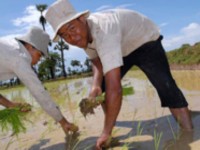Beyond Aid: Ensuring Adaptation to Climate Change Works for the Poor
 GLOBE-Net Business Report - Climate-related shocks are affecting the lives of millions of poor people with increasing frequency and severity. Without urgent action, recent development progress will stall-then go into reverse.
GLOBE-Net Business Report - Climate-related shocks are affecting the lives of millions of poor people with increasing frequency and severity. Without urgent action, recent development progress will stall-then go into reverse.The international community must make a new commitment to fund adaptation to climate change. Funds must be additional to the promise to deliver 0.7 per cent of rich country income as aid and raised and managed in new ways. A global adaptation finance mechanism is needed, able to deliver the scale of funding required and governed according to the principles of equity, subsidiary, transparency, and accountability.
This will insure against future development losses and help to resuscitate the international climate negotiations, laying the foundations for a fair and safe deal at Copenhagen at the end of 2009
Climate change and people
The environmental impacts of climate change are all too familiar topics of conversation these days. But what about its effects on people? The increased frequency and severity of climate-related natural disasters such as droughts, floods, and cyclones cause vast economic damage. Sea level rise and increased storm surges destroy infrastructure and livelihoods in both coastal areas and low-lying adjacent lands. Erratic rainfall, rising temperatures, and extreme weather events harm agricultural production, worsen water scarcity, and spread infectious diseases. Indeed, at home and abroad, climate change imposes huge financial losses and threatens national security.
In both the US and developing countries, poor communities are particularly vulnerable to the impacts of climate change. In the US, such communities were the worst affected by Hurricane Katrina, since they lived in areas that were particularly susceptible to flooding and had few resources to escape from or cope with the disaster. In Darfur, Sudan, drought drove marginal herders to migrate in search of pastures, leading to competition and tensions with resident farming communities.
In Mozambique in 2000-1, poor communities likewise occupied the areas worst affected by the country’s catastrophic floods and had the fewest means with which to cope. These impacts on vulnerable communities also impose wider costs on society, since instability and desperation can have costly and tragic spill over effects.
Investments that reduce the climate vulnerability of these communities can help reduce the adverse consequences of climate change for people while at the same time lowering avoidable expenditures on crisis management, enhancing national security, and creating job opportunities both here and abroad. Such investments can also improve America’s image abroad-demonstrating that the US is willing and able to lead on climate change issues and is committed to helping developing countries adapt to the consequences of climate change.
Making such investments is in our best interest even during a time of economic hardship.
This highly readable and informative Briefing Paper by Oxfam (September 2009) is worth the read. It provides insights on the human consequences of climate change that will help business leaders to better understand why investments in communities now will pay off in the future.
Source: oxfamamerica.orgYou can return to the main Market News page, or press the Back button on your browser.

